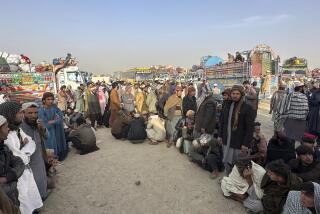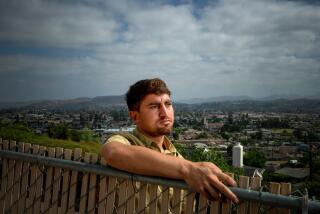Family Fears for Safety of Deported Detainee
- Share via
A longtime California resident, who a decade ago attended flight schools with a now-convicted terrorist, has been deported to Pakistan, and his whereabouts are a mystery to family, friends and U.S. officials.
Nasir Ali Mubarak agreed last month to leave the U.S. under pressure from federal authorities who long ago determined that his student visa had expired.
But after being escorted to Pakistan by two INS agents, Mubarak, 35, was taken into custody by plainclothes Pakistani authorities, according to the INS. Mubarak has not been heard from again.
Mubarak’s detention has angered his American-born wife and prompted Amnesty International to formally request that the U.S. government take steps to ensure his safety.
“The fact is the U.S. government sent him back, and then they say they don’t know where he is. And that is really disgusting to me,” said Stephanie Mubarak, who lives just outside Chico, where her husband ran an aircraft painting business.
In letters to U.S. officials, Amnesty International raised “grave and pressing fears” about the well-being of Mubarak, who moved to California from the United Arab Emirates in 1991 and had not been in Pakistan since he was 3 years old.
“The U.S. has an obligation not to return anyone to a country where they are at risk of serious human rights abuses,” wrote Ignacio Saiz, the program director in America for the human rights organization.
Mubarak, a pilot who has two American-born children, was among hundreds of foreign nationals questioned by the FBI immediately after the attacks of Sept. 11. Records and interviews show Mubarak came to the attention of federal authorities because he was a friend and roommate a decade ago of Abdul Hakim Murad, a Pakistani sentenced to life in prison for plotting to blow up 12 U.S. jetliners.
Since Sept. 11, more than 1,000 people detained across the country for questioning have been deported for immigration violations. But Mubarak’s case appears to be a rarity, said Los Angeles attorney Paul Hoffman.
“As a civil rights lawyer, I have been involved in litigation where people detained after Sept. 11 have been deported,” said Hoffman, who was recently named chairman of Amnesty International. “And I have not heard of any case like this where someone has been deported and then not heard from.”
After questioning Mubarak several times beginning Sept. 11, authorities never charged him with any links to terrorism. Indeed, an FBI report in June detailed the friendship between Mubarak and Murad but also noted that Mubarak is not a practicing Muslim and “is not a member of any groups.”
That same month, he was taken into custody at Dallas/Fort Worth International Airport while traveling with his wife.
Mubarak had faced deportation since 1999 for overstaying his student visa and had remained free while appealing on grounds that he was eligible for permanent residency based on his marriage. But after the June arrest, authorities pressed their case to deport him and contended that he was a flight risk who should not be released from custody.
Mubarak, who had long challenged his deportation, became so frustrated by his limited prospects of remaining in the U.S. that he agreed to leave the country, according to his wife and attorney.
“It was disconcerting for him to even go to Pakistan,” said Stephanie Mubarak. “He didn’t know what he would do there. He didn’t know how he would make a living. He had no family there.
“But he told me he didn’t want to be in a country that didn’t want him,” his wife said. “He said, ‘I haven’t done anything wrong ... and I will not live in fear of being picked up when I have done nothing.”
On Aug. 29, Mubarak left the U.S. under the escort of two INS agents, arriving at the Islamabad airport the following night.
Alarmed that they had not hear from him since, his wife and his attorney requested information from the U.S. government.
An INS attorney in San Francisco replied in a Sept. 10 letter that after Mubarak and the INS officers arrived at the airport in Pakistan, they were approached by “persons who our officers believe were officials of the Pakistani government.
“These persons were not in uniform and did not identify themselves and so, the officers are not aware of the agency or agencies of the Pakistani government to which these officials belong,” Paul K. Nishiie, assistant district counsel for the INS, wrote to Mubarak’s attorney, Marc Van Der Hout.
Mubarak and the INS officers were driven to an airport lounge where their travel documents were examined, Nishiie wrote. “While in the executive lounge,” he added, “Mr. Mubarak told one of the INS officers that he knew the person who appeared to be in charge of the other officials.”
After their documents were examined, Mubarak and the INS officers were escorted outside the airport terminal to two parked cars and a jeep, Nishiie wrote.
“Mr. Mubarak was asked to get into the jeep with his luggage, which he did. Once Mr. Mubarak was in the jeep it drove away,” Nishiie wrote, adding that as the jeep pulled away, a Pakistani official told one of the INS officers that Mubarak was being taken to a detention center.
“The officers have no knowledge as to the truth of the statement,” Nishiie wrote. “This was the last time the INS officers had any contact with Mr. Mubarak.”
While Mubarak’s attorney and others have raised the specter that he may have been turned over to Pakistani officials at the behest of the U.S., Nishiie denied that notion.
“At no time did either INS officer ask any official of the Pakistani government to detain Mr. Mubarak,” he wrote. “Nor are the INS officers aware of any request or inducement, on the part of any component of the United States Department of Justice to have the government of Pakistan detain Mr. Mubarak upon his arrival.”
INS officials refused further comment on the case, referring calls to the State Department. A spokesman there said he was unaware of the case and knew of no legal authority requiring the department to take responsibility abroad for non-U.S. citizens.
An FBI spokesman in Sacramento said agents there completed their investigation of Mubarak after his case was referred to the INS.
“We were finished with Mr. Mubarak when our agent last testified at his deportation hearing,” said Supervisory Special Agent Frank G. Scafidi. “And we have made no requests of any government anywhere to intercede on our behalf with him.”
An official spokesman for the Pakistan Embassy in Washington, D.C., said he was unaware of the case but would not be surprised that someone deported from the U.S. would be questioned upon their arrival in Pakistan.
“If it is a law-and-order matter, they are not obliged to tell us what they are doing,” said press attache Asad Hayauddin. “But we will look into the matter.”
Meantime, Mubarak’s wife said she grows more concerned by the day for his safety. “I just keep praying every day,” she said, “and hoping.”
Her husband’s attorney, Van Der Hout, said, “They accuse him of being involved in terrorist activity with absolutely no evidence to support such charges, hand him over to the Pakistani government and then attempt to wash their hands of the whole matter when he disappears into the abysses of Islamabad.”
*
Times staff writer Henry Weinstein contributed to this report.
More to Read
Sign up for Essential California
The most important California stories and recommendations in your inbox every morning.
You may occasionally receive promotional content from the Los Angeles Times.













